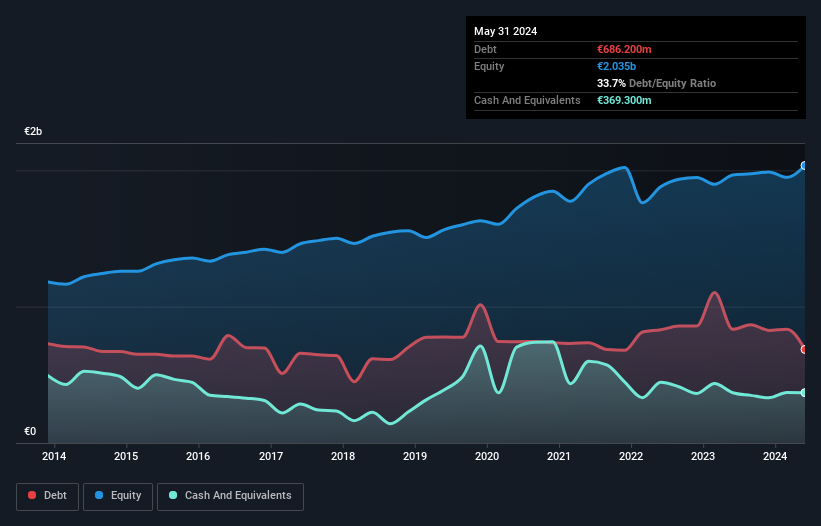- Germany
- /
- Specialty Stores
- /
- XTRA:HBH
These 4 Measures Indicate That HORNBACH Holding KGaA (ETR:HBH) Is Using Debt Extensively

Warren Buffett famously said, 'Volatility is far from synonymous with risk.' When we think about how risky a company is, we always like to look at its use of debt, since debt overload can lead to ruin. We can see that HORNBACH Holding AG & Co. KGaA (ETR:HBH) does use debt in its business. But is this debt a concern to shareholders?
What Risk Does Debt Bring?
Debt and other liabilities become risky for a business when it cannot easily fulfill those obligations, either with free cash flow or by raising capital at an attractive price. If things get really bad, the lenders can take control of the business. However, a more frequent (but still costly) occurrence is where a company must issue shares at bargain-basement prices, permanently diluting shareholders, just to shore up its balance sheet. Of course, plenty of companies use debt to fund growth, without any negative consequences. When we think about a company's use of debt, we first look at cash and debt together.
View our latest analysis for HORNBACH Holding KGaA
How Much Debt Does HORNBACH Holding KGaA Carry?
The image below, which you can click on for greater detail, shows that HORNBACH Holding KGaA had debt of €686.2m at the end of May 2024, a reduction from €833.6m over a year. However, it does have €369.3m in cash offsetting this, leading to net debt of about €316.9m.

How Strong Is HORNBACH Holding KGaA's Balance Sheet?
Zooming in on the latest balance sheet data, we can see that HORNBACH Holding KGaA had liabilities of €1.00b due within 12 months and liabilities of €1.46b due beyond that. On the other hand, it had cash of €369.3m and €89.1m worth of receivables due within a year. So its liabilities total €2.00b more than the combination of its cash and short-term receivables.
This deficit casts a shadow over the €1.25b company, like a colossus towering over mere mortals. So we definitely think shareholders need to watch this one closely. At the end of the day, HORNBACH Holding KGaA would probably need a major re-capitalization if its creditors were to demand repayment.
We use two main ratios to inform us about debt levels relative to earnings. The first is net debt divided by earnings before interest, tax, depreciation, and amortization (EBITDA), while the second is how many times its earnings before interest and tax (EBIT) covers its interest expense (or its interest cover, for short). The advantage of this approach is that we take into account both the absolute quantum of debt (with net debt to EBITDA) and the actual interest expenses associated with that debt (with its interest cover ratio).
Looking at its net debt to EBITDA of 0.79 and interest cover of 6.3 times, it seems to us that HORNBACH Holding KGaA is probably using debt in a pretty reasonable way. So we'd recommend keeping a close eye on the impact financing costs are having on the business. And we also note warmly that HORNBACH Holding KGaA grew its EBIT by 17% last year, making its debt load easier to handle. There's no doubt that we learn most about debt from the balance sheet. But ultimately the future profitability of the business will decide if HORNBACH Holding KGaA can strengthen its balance sheet over time. So if you want to see what the professionals think, you might find this free report on analyst profit forecasts to be interesting.
Finally, a company can only pay off debt with cold hard cash, not accounting profits. So the logical step is to look at the proportion of that EBIT that is matched by actual free cash flow. Over the most recent three years, HORNBACH Holding KGaA recorded free cash flow worth 60% of its EBIT, which is around normal, given free cash flow excludes interest and tax. This free cash flow puts the company in a good position to pay down debt, when appropriate.
Our View
HORNBACH Holding KGaA's level of total liabilities was a real negative on this analysis, although the other factors we considered cast it in a significantly better light. In particular, its net debt to EBITDA was re-invigorating. Taking the abovementioned factors together we do think HORNBACH Holding KGaA's debt poses some risks to the business. So while that leverage does boost returns on equity, we wouldn't really want to see it increase from here. When analysing debt levels, the balance sheet is the obvious place to start. But ultimately, every company can contain risks that exist outside of the balance sheet. For instance, we've identified 1 warning sign for HORNBACH Holding KGaA that you should be aware of.
At the end of the day, it's often better to focus on companies that are free from net debt. You can access our special list of such companies (all with a track record of profit growth). It's free.
If you're looking to trade HORNBACH Holding KGaA, open an account with the lowest-cost platform trusted by professionals, Interactive Brokers.
With clients in over 200 countries and territories, and access to 160 markets, IBKR lets you trade stocks, options, futures, forex, bonds and funds from a single integrated account.
Enjoy no hidden fees, no account minimums, and FX conversion rates as low as 0.03%, far better than what most brokers offer.
Sponsored ContentValuation is complex, but we're here to simplify it.
Discover if HORNBACH Holding KGaA might be undervalued or overvalued with our detailed analysis, featuring fair value estimates, potential risks, dividends, insider trades, and its financial condition.
Access Free AnalysisHave feedback on this article? Concerned about the content? Get in touch with us directly. Alternatively, email editorial-team (at) simplywallst.com.
This article by Simply Wall St is general in nature. We provide commentary based on historical data and analyst forecasts only using an unbiased methodology and our articles are not intended to be financial advice. It does not constitute a recommendation to buy or sell any stock, and does not take account of your objectives, or your financial situation. We aim to bring you long-term focused analysis driven by fundamental data. Note that our analysis may not factor in the latest price-sensitive company announcements or qualitative material. Simply Wall St has no position in any stocks mentioned.
About XTRA:HBH
HORNBACH Holding KGaA
Through its subsidiaries, develops and operates do-it-yourself (DIY) megastores with garden centers in Germany and other European countries.
Flawless balance sheet with proven track record.
Similar Companies
Market Insights
Community Narratives



